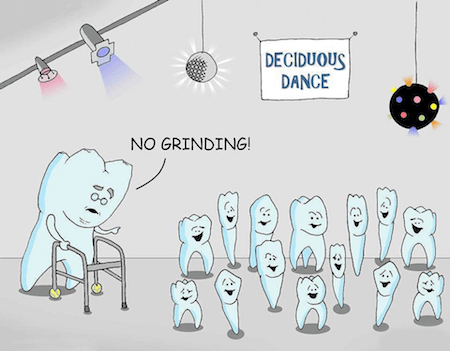Maybe you have noticed that your spouse often clenches and moves his/her jaw at night. If so, chances are you have been listening to an annoying crunching sound from your spouse's mouth as your partner furiously moves the teeth back and forth. If you experience this almost every night, it's high time for you to help your loved one.
However, you should first learn how the symptoms of teeth grinding (known as bruxism) can be treated before doing anything else. Luckily, there's a wide variety of treatments, methods, and products that heal bruxism with great success. Read on to find out more.

Why do some people clench and grind their teeth?
In most cases, bruxism affects adults aged between 25-45, but it also occurs in children when their permanent teeth appear in the mouth.
Unfortunately, the causes of this awful condition are still not completely clear. It is usually associated with other factors like sleep disorders and stress. Sometimes teeth grinding occurs as a consequence of some lifestyle factors or as a side effect of certain medications.
Bruxism in children
When talking about teeth grinding in children, keep in mind that bruxism may not be a problem that should be addressed by a dentist. Since young children still have the baby teeth, you need not worry if your little one has flattened and lost his/her teeth from excessive grinding because the permanent ones are going to come in soon. The majority of children stop grinding their teeth naturally as they get older.
Bruxism in adults
With regard to adults, the most common causes of teeth grinding include:
- Sleep disorders
- Oral and teething discomfort
- Abnormal bite
- Facial or oral pain
- Muscle spasms
- Stress and anxiety
- Medications
- Lifestyle factors (like smoking and drinking)
Symptoms of bruxism
Whether teeth grinding happens during the day or at night, it frequently leads to results that can seriously affect oral health. Here are the most common symptoms and signs of bruxism:
- Jaw tenderness
- An aching jawline
- Pain in the face
- Earaches
- Soreness near or in the ear
- Tightness in the shoulders
- Inflammation of the gums
- Tooth wear and damage
Bruxism treatment and solutions
Once you've identified bruxism symptoms, start looking for the solution that can address the problem. Instead of one universal solution, there's a wide range of medical options and treatments out there. Take into consideration the following tips:
- Change sleeping position
- Try to reduce stress
- Avoid stimulating substances
- Avoid bad habits
- Practice good sleep habits
- Participate in an exercise program
- Avoid chewing gum
- Avoiding alcohol
- Avoiding caffeine
- Check your medications
- Stay hydrated
In addition, you should consider these medical options and therapies:
- Get physical therapy
- Massage the face, jaw muscles, and neck
- Use a wet, warm washcloth on the jaw
- Use relaxation techniques
- Try cognitive behavior therapy
- Have regular dental checkups
- Visit a chiropractor
As you can see, there are a lot of options to choose from. Aside from all these solutions, you should particularly check out oral appliances like night guards and mouth guards that are specially designed for bruxism. In fact, mouth guards hold the jaw in a set position and thus prevent teeth from making contact and grinding while you sleep. Make use of these devices to stop grinding and start sleeping soundly.
